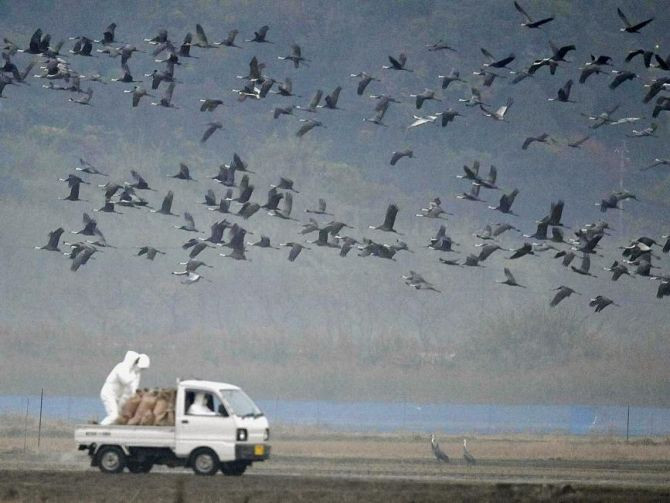Bird Flu Experts Halt Airborne Virus Experiments

In the midst of a growing global controversy, flu researchers have announced a moratorium on a potentially deadlier, airborne influenza virus and have voluntarily suspended their studies for 60 days.
Researchers say they want “to allow time for international discussion” due to government concerns of risks that the flu discovery could be used as a form of bioterrorism, according to a letter jointly published in the journals Nature and Science on Friday.
A month ago, the United States government asked both journals to publish only an abridged version of the two flu studies. Furthermore, the U.S. asked that researchers not reveal details "that could enable replication of the experiments by those who would seek to do harm.” The journals and scientists had reluctantly agreed to government demands on the condition that there will be a process that would allow information from these flu studies to be made available to legitimate flu researchers on a need-to-know basis.
Since then, the U.S. government along with the World Health Organization and other regulatory bodies have been scrambling to find an appropriate procedure that caters to the wishes of the scientific community on flu research and to establish a framework that allows international oversight of such research.
Researchers said that the pause was intended to allow time for regulatory bodies to discuss flu research proceedings.
"To provide time for these discussions, we have agreed on a voluntary pause of 60 days on any research involving highly pathogenic avian influenza H5N1 viruses leading to the generation of viruses that are more transmissible in mammals," researchers wrote in the statement released Friday.
Researchers from Erasmus and the University of Wisconsin created and demonstrated that their mutant H5N1 can be transmitted through the air between ferrets, animals considered to be good models of how influenza viruses affect humans.
Researchers added that that they also plan on organizing an international forum to debate the risks and benefits of flu research.
"We recognize that we and the rest of the scientific community need to clearly explain the benefits of this important research and the measures taken to minimize its possible risks," a group of 39 flu researchers wrote in a statement released on Friday.
Although, scientists have not tested the virus’ ability to spread between people by coughing or sneezing, as such experiments would be unethical, biosecurity experts feared that the escape of such virus or information pertaining to the deadly virus that is easily transmissible between mammals could spark a pandemic worse than the 1912 outbreak of the Spanish flu that claimed around 20 to 40 million lives.
Researchers from two separate flu studies had defended the research to be vital to public health efforts and to be important for detecting when the H5N1 influenza virus might change to spark another devastating pandemic, and suggested that the government’s order to scrap certain information from their research borders outright scientific censorship.
"The continuous threat of an influenza pandemic represents one of the biggest challenges in public health,” wrote the researchers in the statement. "A major obstacle in preventing influenza pandemics is that little is known regarding what makes an influenza virus transmissible in humans. As a consequence, the potential pandemic risk associated with the many different influenza viruses of animals cannot be assessed with any certainty."
In addition to halting H5N1 transmissibility research, "no experiments with live H5N1 or H5 HA reassortant viruses already shown to be transmissible in ferrets will be conducted during this time. We will continue to assess the transmissibility of H5N1 influenza viruses that emerge in nature and pose a continuing threat to human health".
“Scientists need to have their voices heard in this debate," said Yoshihiro Kawaoka of the University of Wisconsin-Madison, lead investigator on one of the flu experiments submitted to Nature and researcher part of today's statement. “We hope that by having a calm and reasoned discussion of the facts, scientists and biosecurity experts can reach a better understanding and find ways to enable the research to go forward while minimizing risks.“
“I am very much in favor of having a pause,” said Anthony Fauci, director of the US National Institute of Allergy and Infectious Diseases, who had advised the U.S. government to ask flu researchers to cut certain information from studies to Nature.
However, Fauci noted that the length of the moratorium is not long and said that researchers were more concerned about an open-ended moratorium.
“60 days as a start I think is reasonable, and after 60 days we will re-evaluate it,” Fauci said.
“The pause is welcome in the sense that hopefully it will relieve some of the immediate urgency in terms of trying to chart a course forward,” said Michael Osterholm, who heads the University of Minnesota’s Center for Infectious Disease Research and Policy in Minneapolis, and a member of the US National Science Advisory Board for Biosecurity.
However Osterholm thought that the duration of the pause is too short.
“The 60 days will likely not be adequate in terms of getting a truly workable international policy and applying that. I just don't think that's realistic,” Osterholm said. He also noted that the statement did not mention any voluntary moratorium on the publication of flu research, and that the NSABB is thinking of recommending one.
Published by Medicaldaily.com



























